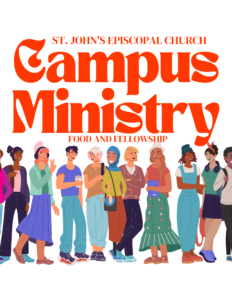Annual Church Picnic – July 2nd

Sign ups are on the bridge for the Church Picnic. Let us know if you can contribute a side or dessert! All are welcome to the annual church picnic at noon on Sunday, July 2nd. Hope to see you there!

Sign ups are on the bridge for the Church Picnic. Let us know if you can contribute a side or dessert! All are welcome to the annual church picnic at noon on Sunday, July 2nd. Hope to see you there!

Join us for our Sunday Services at 8:00am and 10:30am decked out in your best Hawaiian / tropical outfit! We want to see your most hibiscus covered frock, your palm leaf button up, your fun-in-the-sun looks! There will be prizes given, so don’t miss it.
As always, you can join in on the fun online during our 10:30am service streaming on Facebook Live or Youtube.

Please join us in welcoming Bishop Co-Adjutor Anne B. Jolly during her visit to St. John’s. We will hold a Confirmation and Reception ceremony during our 10:30am service. All are welcome!

Please join us for a Healing Service each second Thursday of the month at 12:05pm. For more information please contact the church office. All are welcome to attend this service.

All young adults and campus students are welcome to attend our Campus Ministry, Sunday, April 23rd at 11:45pm in the Parlor. Join us for food and fellowship. Can’t wait to see you!

Photo Directory Scheduling and Sessions
It is time for us to have a new photo directory for our church. The Parish Life and Growth committee is excited to oversee the scheduling for this new directory, and we want to make it as simple as possible for everyone. Every family who is photographed will receive a free 8 x 10 photo and a free photo directory for our church. Not only is this free to the families, it is also free to Saint Johns Church. Of course, you will have the opportunity to purchase additional photos.
**Note: these sessions are not only for members of our church and can be extended to family, friends, neighbors who may want the opportunity for a professional family photo, but cannot afford the session. These sessions can choose to not be included in the directory, but will still get the free 8×10 photo & help us reach our goal. So please, feel free to invite more to join this session.
The photographers and representatives from Universal Church Directories will be in our parlor from 2 PM to 8:30 PM on Tuesday and Wednesday, April 25 and 26th.
There are four ways that you can schedule your appointment.
On Sunday mornings, you can see a member of the Parish Life and Growth committee who will register you between or after Sunday services.
We are hoping for maximum participation in this project as we reconnect following the months of separation due to Covid. If you would like to help in any way or need more information, please call Heather at the office.

OUTDOOR CLEANUP: PART 2
John Donne, one of the most famous preachers of the early seventeenth century, was also one of the great poets of the era (although the majority of his poems were only published after his death). While some of his poems are quite well known, even the less familiar have important messages, such as the litany beginning with these striking lines:
Hear us, O hear us, Lord; to Thee
A sinner is more music, when he prays,
Than spheres’ or angels’ praises be… (1-3)
Donne suggests God loves us so deeply that even though we may have fallen short, even though we may suffer from limitations and missteps, our prayers are more beautiful to our loving God than the majesty of the universe or the worship of heaven! During Lent, when we may turn to God in repentance and prayer, aware of our shortcomings, we do so knowing that God’s love for us is beyond all we can imagine.
But Donne also speaks of another example of God’s love which may not occur to us so readily, saying of our prayers:
Hear us, for till Thou hear us, Lord,
We know not what to say;
Thine ear to our sighs, tears, thoughts, gives voice and word… (5-7)
God is not only listening to our prayers; God is actually guiding our prayers, giving voice to our intercessions and needs. Donne is no doubt thinking of Romans 8:26, in which Paul tells us, “The Spirit helps us in our weakness; for we do not know how to pray as we ought, but that very Spirit intercedes with sighs too deep for words.” There is something deeply comforting in realizing that our prayers are actually assisted and even created by the very God who hears them! As John Donne puts it at the conclusion of this litany, addressing God:
“Hear Thyself now, for Thou in us dost pray” (9).
from Steve Geitgey
Micah 6:8
“What is it that the Lord your God requires of you but to do justice, love mercy and walk humbly with the Lord your God.” I once had this verse taped to my office door so I would see it whenever I went out to go about my duties. I needed it. Days were often challenging, and it was helpful for me to focus on God’s priorities: justice and mercy. Recently, as I reflected on this verse, I realized that perhaps the key is humility. Do my ideas about what constitutes justice and mercy sometimes obscure the vision God has for creation? I am sure they often do. Therefore, this Lent, may I learn to walk humbly with You, Lord. In walking with You, may I see, at least in part, creation through Your eyes of love. Grant me the wisdom and strength to “do justice”. Guide me so that my actions may show forth Your boundless mercy. In Jesus’ name, I pray. Amen.